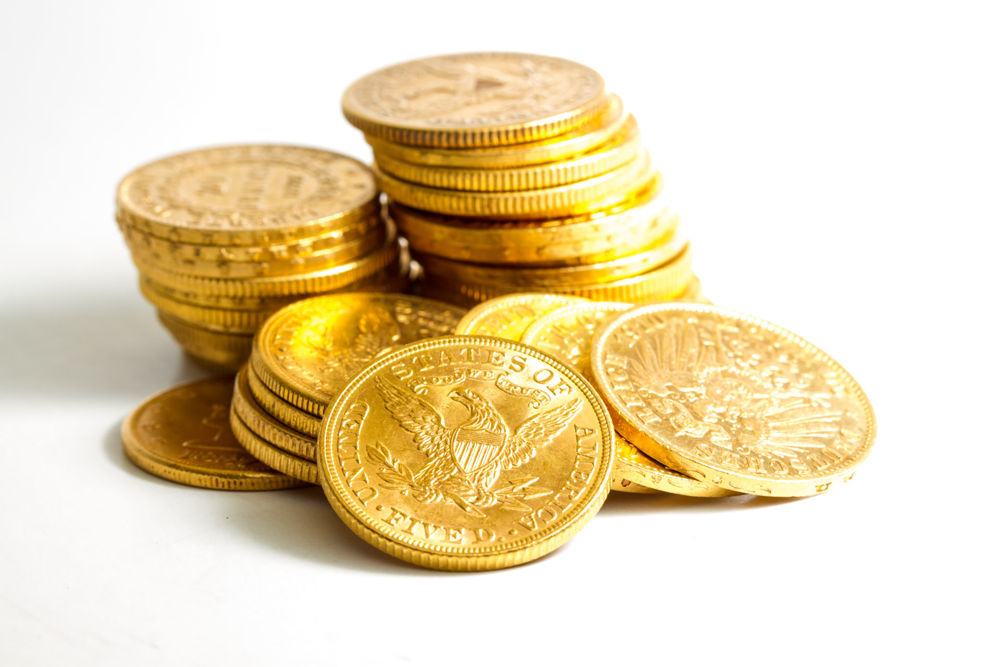Posted on February 24, 2022


Veterans provide great services to our country but often struggle with financial stability and security once they return to civilian life. Successfully managing money, starting investments, and growing them can be challenging. Many veterans invest in the stability and inflation protection that gold, silver, and other precious metals provide.
Investing in gold, silver, and other precious metals has many benefits – they’re a hedge against inflation, they protect you and your family from political and economic uncertainty, and they are tangible, finite investments with unique growth potential. They also serve as a universally-recognized currency of last resort.
Veterans who started investing in precious metals early in life can amass a substantial investment by retirement age. For example, let’s consider the case of First Sergeant Gerald T., who saw two tours of duty in Vietnam (1967, 1968) and one deployment to the Middle East (1990-91). He saw first-hand how conflict disrupted lives and just how quickly paper money could go from prized possession to fuel for a campfire. He left military service at age 46 and purchased 2-4 oz of gold yearly before retiring at age 68 with a stockpile of 102 ounces of gold. That’s worth nearly $200,000 at the time of writing.
If you’re at this stage of your life where you’ve amassed a sizable quantity of precious metals, you might be wondering how to pass on your financial legacy to your heirs.
Anything can happen to your hard-earned investment if you don’t have a solid plan. However, with the right steps, you can control where, when, and to whom your precious metals go after you die.
This guide aspires to provide all the resources veterans will need to properly leave a precious metals inheritance to their loved ones (or a charitable organization). It can also help those that have inherited precious metals.
Table of Contents
If you’ve retired and have an extensive collection of precious metals, you should plan what happens to them after you die. If you plan to pass the precious metals off as an inheritance, setting up a will and discussing your decisions with your heirs is of the utmost importance.
Having a conversation with your heirs about their inheritance could be a difficult topic to broach. It’s hard for anyone to start a conversation with “When I die…”, but the harsh reality is that we’re all mortal.
Instead of bringing up the conversation about an inheritance out of the blue, plan the talk for a later day or time. For example, “I want to talk with you about my will later this week; when can we get together?” is a great way to start.
Informing those receiving your precious metals inheritance gives them time to understand what they can and should do with your gift. Instead of being surprised, they can be well informed. That protects them from being taken advantage of by unscrupulous vultures attempting to profit on grief by scooping up your precious metals collection for a lowball price.
During your conversation, you can tell your heirs what type of metals they will receive, where it is stored, and how they can claim them. (Or you can leave them a treasure map– but really, this should be part of your estate plan.) Depending on your storage method, you may need to authorize their access. Check with your depository or bank for details on this. If you choose home storage, your heirs might need nothing more than the combination to your safe.
Additionally, you can use this time to educate them on gold, silver, and whatever other precious metals they will inherit and what they can do with it after you pass (more on this later).
 A will is a legal document that states who will receive your assets, including your precious metals, after you die. When you have a will that clearly states who gets your belongings, it makes the inheritance process much smoother.
A will is a legal document that states who will receive your assets, including your precious metals, after you die. When you have a will that clearly states who gets your belongings, it makes the inheritance process much smoother.
Wills are legally binding, and that means there’s no guessing – nor arguing – about what you want to happen after you’re gone. Therefore, if you don’t have a will, you should get one as quickly as possible to ensure the inheritance of your precious metals happens the way you want it. You may already have a last will and testament you prepared as part of deployment planning. If so, make sure it’s up to date and accurately reflects your wishes.
Wills are not just for the sick or old; everyone with assets – including those of us blessed with youth and health – should make a will. Here are some resources that cover the importance of wills and how to create one.
Estate planning includes the act of determining how your assets, including your precious metals, are maintained, managed, and disbursed in the event of your death. Estate planning also includes planning for and minimizing estate taxes, creating beneficiaries, making funeral arrangements, and setting power of attorney (POA).
There are several estate planning strategies that you can use to limit estate taxes, such as making charitable donations and creating trusts. Usually, individuals make their estate plans with the help of an attorney who specializes in estate law.
Here are some resources on estate planning and why it is essential.
A trust is a legal arrangement that allows you to arrange how and when your precious metals and other assets get to your beneficiaries. Trusts help you protect your legacy, provide control of your wealth, and can establish privacy and probate savings. A trustee holds your assets on behalf of your beneficiaries and manages, maintains, and/or passes on those assets exactly how and when you choose.
Trusts are generally used to minimize estate taxes and pass assets outside of probate, saving time and court fees.
There are two main types of trusts: revocable and irrevocable trusts. Revocable trusts are living trusts (you are the trustee until you die) and can help avoid probate.
Irrevocable trusts transfer your assets from your estate to your beneficiaries after you pass and remove them from your estate to minimize your tax liability.
Here are some helpful resources on the basics of trusts, how and why to form one, and the different types:
 Keeping an inventory of your precious metals not only helps with establishing a cost basis but allows your heirs to determine how much their inheritance is worth easily. A detailed inventory is beneficial because most people who inherit precious metals have no experience with them. This can lead to them liquating your gold, silver, etc., for a price well below fair market value.
Keeping an inventory of your precious metals not only helps with establishing a cost basis but allows your heirs to determine how much their inheritance is worth easily. A detailed inventory is beneficial because most people who inherit precious metals have no experience with them. This can lead to them liquating your gold, silver, etc., for a price well below fair market value.
You can also document exactly why each gold or silver bar, round, and coin is included in your collection. For example, your gold American eagle coins may fit in with some of your life events, such as owning one minted the year you got married or when a child was born. That way, your heirs can also understand the sentimental value of your collection.
Be sure to routinely update your inventory tracker and make it available to your trustee and/or your heirs through your will.
You can track your collection by simply writing it down on a piece of paper. Just keep in mind that a piece of paper can be easily lost or destroyed. A better way could be inputting your collection in a spreadsheet or with a dedicated coin collecting software. Regardless of the method you choose, make sure your trustee and/or heirs can access this document (and make backup copies!).
Some examples are listed below.
 Pass on your inheritance the right way
Pass on your inheritance the right wayThe primary purpose of estate planning is to leave as much of your wealth to your beneficiaries as possible. Besides naming beneficiaries, you can take extra steps to ensure your estate provides your precious metals to your beneficiaries with minimal headaches and obstacles.
Along with a thorough estate plan, you should have clear and direct communication with all of your beneficiaries about how much they will get and where it is stored. This step is especially critical if your inheritance is not spread equally amongst your beneficiaries.
Making sure your beneficiaries understand the value of precious metals is essential. When they inherit your precious metals from you, they will have three main options:
Whatever your beneficiaries decide to do with their inheritance, understanding gold, silver, and platinum's value, utility, and benefits is critical. Knowing what they’re worth and how to value them properly will ensure they get the best value when (and if) they decide to sell any of the precious metals they inherit from you.
In some things like real estate, only having one of something can make it difficult to decide how to distribute it to multiple heirs. Coin collections too may present this problem. A complete proof set from the early 20th century, for instance, may be worth more together than the sum of its parts. (The opposite may be true for more recent sets.)
Knowing exactly what you have, the values of each piece of your collection and the collection as a whole, as well as how your heirs’ plans are all critical to know ahead of time. Some heirs might prefer to continue keeping a collection together. Others would prefer the cash.
Additionally, the option of creating a trust to both keep the collection together while offering ownership of it spread across multiple heirs might be one consideration you start with. The heirs can then decide to keep it in a trust, sell them, or buy out the other heirs.
 Consider pre-emptively gifting your estate
Consider pre-emptively gifting your estate Gifting your inheritance before you die has many financial benefits, including the ability to use your annual gift tax exemption to avoid taxes. Besides these tax benefits, there are plenty of personal advantages of a “living inheritance,” too. For example, helping your children pay off their house, sending your grandkids to college without debt, or paying off your family’s financial burdens are just some examples of the joy you can experience with a living inheritance.
Additionally, if your heirs are not experienced with managing money, slowly providing them with smaller financial gifts will help them learn and adapt to better manage money (especially while you’re still around to walk them through it). Conversely, if they receive a huge estate all at once when you pass, they could make severe, even unrecoverable, financial mistakes.
Perhaps you do not have someone in your life that you would like to leave your precious metals. For example, all your children are “well off.” Or you may have the sort of collection that would be prized in a museum, on display, rather than locked away in a vault. In that case, you can create a trust and arrange for your estate to donate them to a charity or non-profit organization of your choice. Alternatively, if you gift a portion of your assets to a charity, it can help lower your estate taxes.
If you inherited precious metals and other assets, you might be wondering if you have any sort of tax consequences. Generally, when you inherit part of an estate, you don’t pay any of the deceased’s taxes; the estate does. The cost basis of your inherited precious metals establishes on the date of death of the person who gifted them to you. It equals the fair market value on that date.
If you ever sell the precious metals, this cost basis is what you use for tax purposes.
Forming an estate plan, making a trust, and establishing a will are great steps to ensure your precious metals go exactly where you want them to. However, to gift your estate in the best way possible, there are many other considerations you must make in regards to your precious metals collection.
Here are additional precious metals factors you should be aware of or consider.
Adding an insurance policy for your precious metals or a simple floater policy (an insurance policy that covers valuable small items) can help protect your precious metals. If you are storing your precious metals at home, insurance is necessary.
 If you are storing your precious metals at home, you not only need insurance but a way to store them safely too. Consider investing in a safe to protect your bullion from theft, fire, and other catastrophes.
If you are storing your precious metals at home, you not only need insurance but a way to store them safely too. Consider investing in a safe to protect your bullion from theft, fire, and other catastrophes.
Make sure to provide all combinations to your storage safes in your will, so your beneficiaries have access after you pass.
Storing some gold and silver bullion at your home provides you easy access in the event of political, economic, or civil instability. However, if you have amassed a sizable investment of physical precious metals, most experts recommend you store it in a vault or depository.
Vaults and depositories carry insurance to fully cover your precious metals. Besides insurance, vaults are much more secure than you can ever make your home. Additionally, for bullion investments greater than $20,000, storage at a depository costs less than an insurance policy for home storage.
If you open an account with a depository, establish a beneficiary with the company you choose. Also, provide their information in your will and estate plan.
Whether you store your precious metals at a depository, a bank safe deposit box, a safe at home, or underneath the floorboards in your house, make sure your beneficiaries have instructions to find and access it after your death. You can always leave your heirs a treasure map to your hidden gold. Or better yet, leave instructions with your estate.
Hiding your precious metals isn’t ideal because your heirs may not ever be able to find them. Hiding your hoard can make it, so your heirs will never benefit from all your hard-earned money. Add instructions and information to your estate plan and will on where to find and how to access your investment.
Additionally, if you have accounts with a depository or a bank, set up a beneficiary for those accounts too.
With a self-directed IRA (SDIRA), you can invest in physical precious metals with all the tax benefits of a conventional IRA. Your precious metals are stored at an approved depository (where they’re secured and insured) and managed by a custodian.
Funding an SDIRA with precious metals is an excellent way to minimize your taxes while you’re alive, as well as your beneficiaries’ tax payments after your death.
If you own a precious metals IRA, you should set up a beneficiary for the account and include it in your estate plan. Conventional inheritance rules apply to SDIRAs too, and you should make sure your beneficiaries understand their options with an inherited IRA.
Veterans (and anyone else) with substantial holdings in precious metals should make an estate plan along with a will. Routinely evaluate and keep a record of your inventory to help your beneficiaries understand what they are inheriting and its value. You can track your collection with an app or software to help.
Also, educate your heirs about precious metals and your advice on what to do with their inheritance. Provide them resources on what they can do with their inherited precious metals after you pass.
Consider your options for gifting your precious metals to your beneficiaries, a living inheritance, a trust, storage at a depository, etc. Examine the tax consequences and the benefits of each option and choose the best methods that work best for your estate.
If you need financial counseling services and will preparation, check out this page on the Veterans Affairs website. Or, to find estate planning services in your area, use this tool from the Senior Veterans Service Alliance.